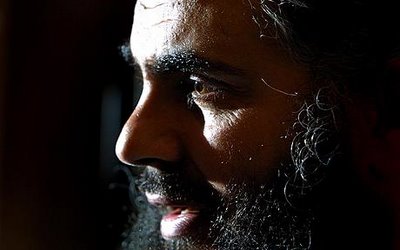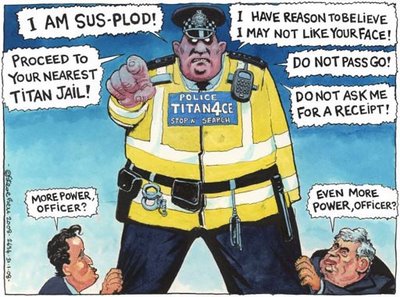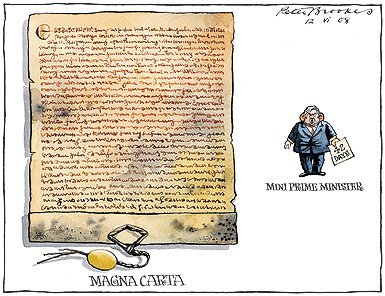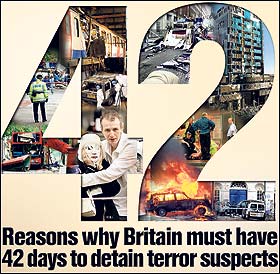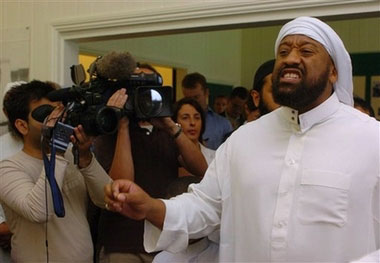Damian Green and the state of the nation.
It's a shame, as the Green case is far more indicative of where the nation is going as opposed to where the state of politics is descending. It's the combination of everything which New Labour has ultimately been building towards, encouraged by the pliant tabloid media which demands ever harsher authoritarian crime polices and by their flexible friends in the police, where national security and anti-terrorism supplant everything else, used opportunistically as the excuse for every little abuse of power and every little act of authorised bullying.
Some might question the link between the arrest of 114 climate change protesters before they had so much as thought of carrying out their plans for peaceful demonstrations, the deletion of a tourist's photographs on the grounds that you can't shoot any building, structure or vehicle involved in London's transportation system, the brutality shown towards some G20 protesters and Damian Green's arrest, but they are all representative of one thing: of an overbearing state which continues to grow in power while the individual continues to be diminished and patronised, with their complaints ignored or whitewashed. The key difference in the latter case was that both the police and government overestimated their power and overstepped themselves in imagining that they could arrest someone who was themselves in a position of power, diminished as it was, and not outrage that person's colleagues and as a result the media. A similar thing almost happened a couple of years earlier, except to the actual party of government with the arrest of Ruth Turner, but that was soon forgotten by those who themselves felt that they were still invulnerable.
Not a single person imagined for a second that Damian Green would be charged with anything. Members of parliament don't get charged when it comes to leaks; their stringers and the other little people involved are the ones that usually have to take one for the team. More surprising was that the Home Affairs Select Committee, especially one chaired by a loyalist like Keith Vaz, noted that despite the claims by the Cabinet Office and Home Office, none of the material leaked even approached breaching national security, something confirmed by the head of the CPS, an organisation which seems to be bucking the trend in remaining fiercely independent, first with Ken Macdonald and now with Kier Starmer at the helm. Notable also was that the police's actions were compared to the Keystone Cops, which isn't quite apposite, for the reason that Keystone Cops were meant to be laughed at. No one is laughing at what the police increasingly seem to be getting up to, as incompetent as their actions at times are.
Whether Jacqui Smith did or did not know that Green was personally going to be arrested, and despite my initial thoughts that I believed it was unlikely, I've now changed my mind somewhat, it's still indicative of how the Home Office has changed under Labour. Undoubtedly the change can be linked right back to the James Bulger murder and the consensus which emerged between the political parties that prison works, but the succession of ridiculously hardline politicians made home secretary began with David Blunkett and has continued since. In turn, each has been more ludicrous and more certain of themselves in succession, and all of them have also shared one political characteristic: they have all been Blairites. All have been dismissive in the traditional Blairite way of established procedure, whether it be populist in nature as it was when John Reid declared that his department was "not fit for purpose" or with Smith not apparently caring one jot that she to all intents and purposes wasted police time, still today defending that calling in Inspector Knacker was the right thing to do. None of her predecessors though were so completely hopeless at their job, so thoroughly discredited and as weak as she has become, thanks both to her expenses claims and other piling up failures. That she is still in her position itself is a miracle, and it is surely one which will not survive any coming reshuffle, although as in the past, she will undoubtedly be replaced by someone just as bad and just as opportunist; the job seems to now require those characteristics.
Few will disagree with Damian Green's statement that he could not think "of a better symbol of an out of touch, authoritarian, failing government that has been in power for too long". The Conservatives however offer no alternative whatsoever on the authoritarian front. If anything, they might well turn out be worse on that score when it comes to crime, and their promise to increase the police's powers of surveillance suggests that despite the clamour which is beginning to build regarding the casual dilution of civil liberties, they still don't understand that there has to be a step change in the relationship between the individual and the state. That it took the arrest of one of their own for them to begin to finally grasp that was an indictment of their own failure to read that mood was changing, and it's even harder to believe that once in power they will be any different to Labour in responding to the anguished cries of the latest tabloid headline. One of the things they could do which might encourage the belief that they will seriously examine just how powerful and unaccountable the police have become is to propose a royal commission into their tactics, as first argued by Martin Kettle. If they seriously want the public to believe they will not be as political as New Labour has been, and the signs from Boris Johnson are that they might even be more so, then it's the absolute least they will have to do.
Labels: authoritarianism, civil liberties, Conservatives, Damian Green, leaks, police, politics, terror laws
